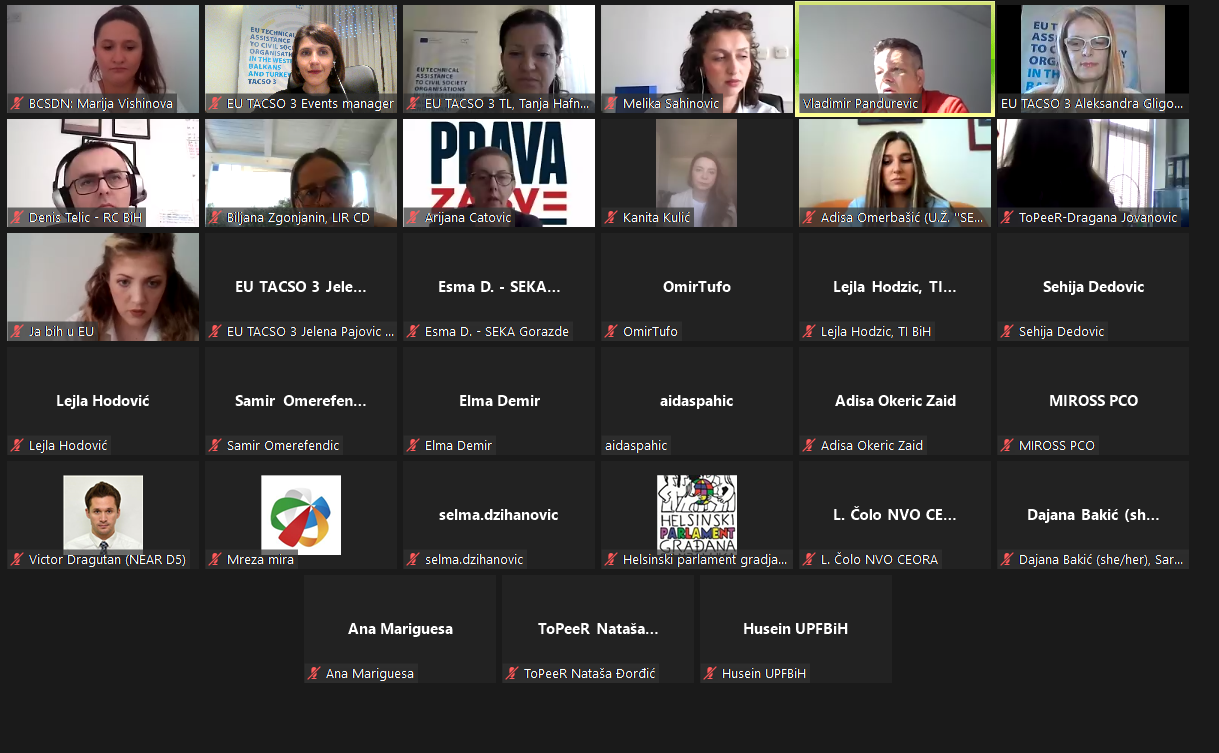
On 6 September 2021, the EU TACSO 3, in cooperation with the Delegations of the European Union to Bosnia and Herzegovina and National Resource Centers (NRCs) organized a Country Consultation and Validation Meeting on the EUCSG 2020 Assessment Report for Bosnia and Herzegovina.
Around 30 participants representing CSOs, public institutions, and international organizations participated in the live discussion during the event, providing their observations and opinions.
The purpose of the meeting was to present the regional findings and that of the state of the enabling environment and CSOs capacities in Bosnia and Herzegovina. Furthermore, the meeting aimed to ensure validation of the assessment results and discuss the recommendations put forward in the report, as well as to assure that CSO representatives and other stakeholders are actively involved in the process.
Vladimir Pandurevic, Program Manager, EU Delegation to Bosnia and Herzegovina opened the event emphasizing the importance of EU civil society guidelines in relation to the EU financing schemes on a national and regional level.
Tanja Hafner Ademi, EU TACSO 3 Team Leader presented the regional context and the main assessment findings, covering three main EUCSG areas: the conducive environment for civil society, the mechanisms for cooperation between CSOs and public institutions, and CSO capacities in the Western Balkan region, and Turkey.
Melika Shahinovic, Balkan Civil Society Development Network Researcher presented details on national assessment findings for Bosnia and Herzegovina. She mentioned that besides desk analysis, interviews, and focus groups, collecting primary information from CSOs was done through a direct survey on the practices and implementation where 116 CSOs completed questionnaires (from more than 3000 invitations sent). It was noted that CSOs sources of funding are mostly governments/ministries – public budgets and other foreign, private, or public sources (e.g., embassies, foundations, etc.), International and EU organizations. The main topic discussed was the need for improving transparency in the public funding of CSOs. Data from the assessment showed that in 2020 funding for CSOs continues to decrease, with budgeted funds cut or redirected to other sectors, with no noticeable single or uniform mechanism for allocation of funds. More than a third (35%) of organizations have a budget below 5,000 EUR per year, while almost 50% of organizations have an annual budget between 5,000 and 50,000 EUR. Lack of different financial sources available for CSOs was mentioned in the presentation but also lack of their capacities in strategic fundraising.
One of the main issues discussed during the presentation was the situation concerning the participation of CSOs in decision making, and functionality of structures and mechanisms for dialogue and cooperation such as national-level agreement on cooperation between the BiH Council of Ministers and NGOs, and the Advisory Body for Implementation of this agreement that has been established. Participants recognized the need for better utilization of possibilities for involving CSOs in consultations during the creation of public policies on national and local levels.
Opinions expressed during the meeting will be compiled and further integrated into the final EUCSG Assessment Report for 2020 for Bosnia and Herzegovina.
